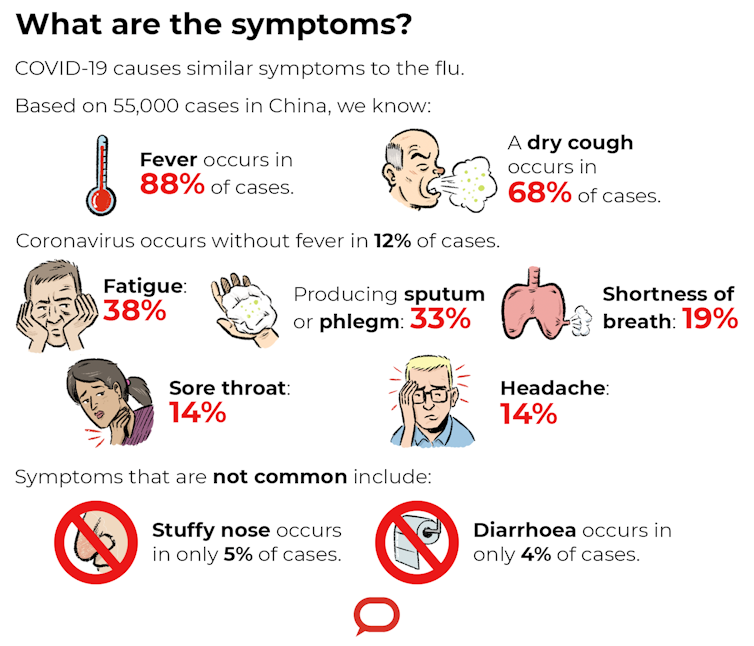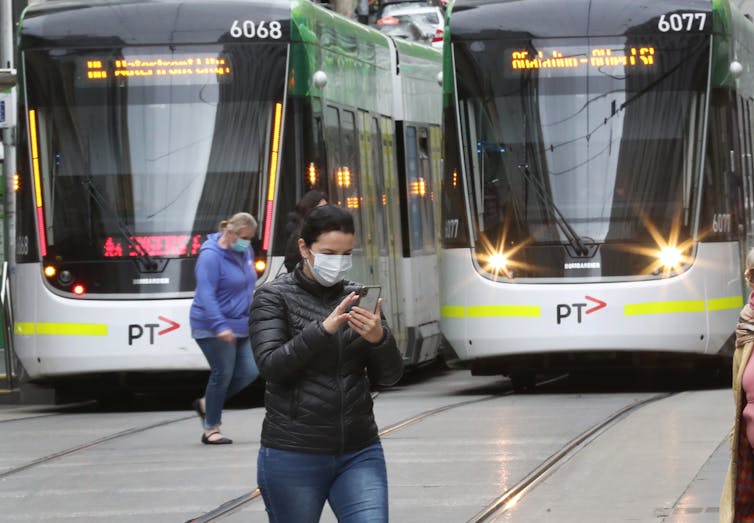Do I need a referral for a COVID-19 test? What happens if you test positive? Your coronavirus questions answered
- Written by Trent Yarwood, Infectious Diseases Physician, Senior Lecturer, James Cook University and, The University of Queensland
As COVID-19 cases surge in Victoria and NSW, authorities have again urged anyone with symptoms, including cough, fever, or sore throat, to get tested. Most results should be available within a few days and people should self-isolate while they’re awaiting results.
Victorian Premier Daniel Andrews said today Victoria recorded 275 new COVID-19 cases. Mask-wearing whenever outside the home will be mandatory for residents of metropolitan Melbourne and Mitchell Shire from Wednesday at 11:59pm.
NSW Premier Gladys Berejiklian said there were 20 new cases in NSW today, and urged residents to avoid crowded places, consider wearing a mask when physical distancing wasn’t possible, and minimise any non-essential travel.
Here are the most important things to know about testing.
Do I need a referral to get a COVID-19 test?
For the vast majority of people, no — you don’t need a referral to get tested at dedicated public COVID-19 testing clinic.
However, you will need a pathology request form if you plan to get tested at a private pathology clinic.
COVID-19-testing clinics in NSW are listed here, and Victorian testing sites (including pop-up clinics) are listed here. The Victorian Department of Health and Human Services says on it website:
Please call ahead before visiting a testing site, unless you choose to be tested at a pop-up testing site.
Testing locations are listed on each state or territory’s health departments, including for Queensland, Western Australia, South Australia, Northern Territory and the Australian Capital Territory.
Start by seeing if there is a pop-up drive-through or walk-through clinic near you. Some public sector fever clinics have a booking system to reduce wait times but many of the pop-up testing drive-through sites will allow you just to show up in your car.
Do not walk unannounced into a private pathology clinic, hospital emergency department or into your GP’s surgery.
If you can’t get to a dedicated public COVID-19 testing clinic, call your GP and ask for a telehealth consult. The GP can organise a pathology request form to be sent electronically to a private pathology clinic and will advise you on how to get tested there.
While you’re waiting for your test results, it’s important to stay at home in case you are infectious.
Read more: Explainer: what's the new coronavirus saliva test, and how does it work?
What happens if I test positive?
You will be notified if you’ve tested positive to COVID-19. If you were tested at a private clinic, you may receive a call from your GP who ordered the test, or from the public health team.
If you were tested at a public testing site like a drive-through clinic, a state government public health official will contact you. They will usually do the contact tracing at the same time.
Their job is to find out about anyone else you may have given the virus to while you’ve been infectious. They will usually ask where you’ve been and who you’ve seen in the last few days before you became ill.
There are national guidelines for management of coronavirus, but how they are implement is usually a state decision. Generally, the facility where you got the test will tell you how long you need to isolate for.
It’s important to ask as many questions as possible when you’re informed of your result.
 The Conversation, CC BY-ND
How can I get tested? Is there a blood test?
Most tests will usually be done by a swab around the back of the throat and the nose. Some sites will either just swab your throat, or just your nose, but the gold standard at the moment is to swab both.
There’s also a new saliva test, which tests a sample you spit into a small container. It’s used in limited circumstances where it’s not possible to take a nasal swab, such as with young children resisting a swab.
The problem is saliva seems to have less of the virus in it than sputum (which is collected from the back of the nose and throat), so a saliva test result may not be as reliable.
There are currently two types of blood tests. One is an antibody test, which can measure whether you’ve already had the virus and recovered. But it’s not very useful because health authorities are more concerned about finding out who has the virus now, so they can do contact tracing.
The Conversation, CC BY-ND
How can I get tested? Is there a blood test?
Most tests will usually be done by a swab around the back of the throat and the nose. Some sites will either just swab your throat, or just your nose, but the gold standard at the moment is to swab both.
There’s also a new saliva test, which tests a sample you spit into a small container. It’s used in limited circumstances where it’s not possible to take a nasal swab, such as with young children resisting a swab.
The problem is saliva seems to have less of the virus in it than sputum (which is collected from the back of the nose and throat), so a saliva test result may not be as reliable.
There are currently two types of blood tests. One is an antibody test, which can measure whether you’ve already had the virus and recovered. But it’s not very useful because health authorities are more concerned about finding out who has the virus now, so they can do contact tracing.
 Mask-wearing outside the home will be mandatory in metropolitan Melbourne and Mitchell Shire from Wednesday at 11:59pm.
DAVID CROSLING/AAP
Researchers from Monash University announced recently they’ve able to detect positive COVID-19 cases using blood samples in about 20 minutes, and identify whether someone has contracted the virus.
However, it’s very new research and likely won’t be rolled out on a large scale very soon. The researchers said last week they’re seeking commercial and government support to upscale production.
Despite problems with new types of tests, in a pandemic it’s important to research and trial novel testing methods that can help us fight the virus.
The most important thing you can do to help stop the spread is to try to maintain physical distancing as much as you can. Wash your hands frequently, and if you develop any symptoms — even very minor ones — err on the side of getting tested.
Read more:
Which face mask should I wear?
Mask-wearing outside the home will be mandatory in metropolitan Melbourne and Mitchell Shire from Wednesday at 11:59pm.
DAVID CROSLING/AAP
Researchers from Monash University announced recently they’ve able to detect positive COVID-19 cases using blood samples in about 20 minutes, and identify whether someone has contracted the virus.
However, it’s very new research and likely won’t be rolled out on a large scale very soon. The researchers said last week they’re seeking commercial and government support to upscale production.
Despite problems with new types of tests, in a pandemic it’s important to research and trial novel testing methods that can help us fight the virus.
The most important thing you can do to help stop the spread is to try to maintain physical distancing as much as you can. Wash your hands frequently, and if you develop any symptoms — even very minor ones — err on the side of getting tested.
Read more:
Which face mask should I wear?
Authors: Trent Yarwood, Infectious Diseases Physician, Senior Lecturer, James Cook University and, The University of Queensland





